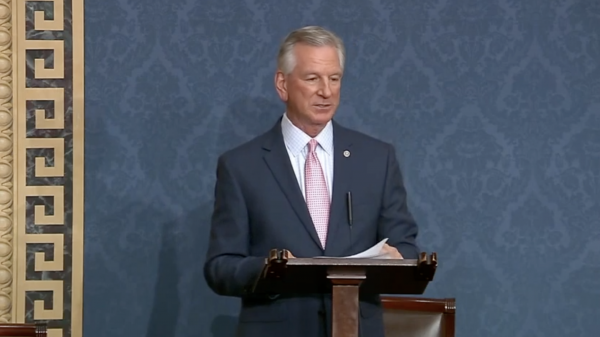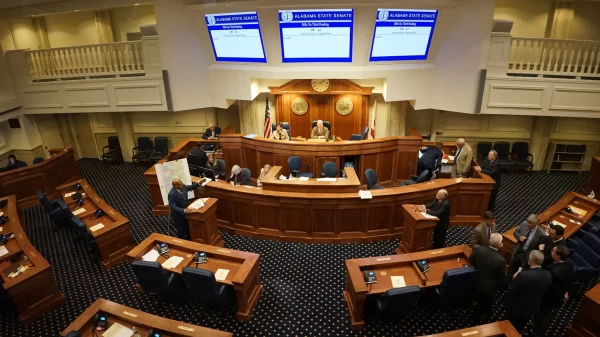A bill to revoke the ability of the Alabama Department of Archives and History Board to appoint its own members will progress to the state Senate floor after passing through its committee Tuesday.
Senate Bill 5 sponsored by Sen. Chris Elliot, R-Josephine, would take the power to appoint vacancies on the ADAH Board of Trustees away from the board and put it in the hands of the governor and legislative leaders.
The state Senate County and Municipal Government Committee on Feb. 18 approved SB5, readying it for a Senate vote.
The Department of Archives and History is currently composed of 16 trustees—including two members from each congressional district and two at-large members. Under existing law, in the event of board vacancies, vacant positions are to be filled by the board, subject to the state Senate’s approval.
“I worked with the Archives and History Department and their folks on this piece of legislation. I think it is reasonable to say that they are neutral on the bill. They’re probably not thrilled with it. I can tell you it’s not where I had it, but I’m also kind of neutral on the bill which might mean we’ve compromised enough to move it along,” Elliot said during the committee meeting.
Elliot said the current version of SB5 would revise the board’s composition to include 17 voting members.
The bill adds the governor as a voting member on the board, who has the power to appoint eight board members. The speaker of the state House of Representatives and president pro tempore of the Senate both have control over appointing four members respectively. The speaker and the speaker pro tempore must each appoint a board member from a list compiled by the Senate minority leader.
All appointees must be sent to the Senate for confirmation. Board members’ terms last six years.
If a new board member is appointed after the death or resignation of their predecessor, they will serve for the remainder of their term. If a board member is appointed to succeed a board member whose term has expired, they will serve a full six-year term.
Elliot was among Republicans who criticized ADAH in June 2023 for hosting a presentation on LGBTQ+ history.
“A number of my colleagues and I just simply had some issues with that. You know, the problem is that we don’t believe that things that happen in folks’ bedrooms ought to be the topic of conversation or really the underlying issue for conversation,” Elliot told WKRG in July 2023 regarding Archives and History’s LGBTQ+ history presentation.
Elliot introduced a bill in the 2023 summer special session to cut the archives’ state funding by $5 million.
Elliot then introduced a bill for the 2024 legislative session which would have given state and legislative officials appointing power for the board, while keeping the board at its current size. The bill passed the Senate and a House committee, but failed to reach the House floor.
ADAH spokesperson, Mary Ameilia Taylor said in an August 2024 statement that the department’s structure “has worked well for 123 years.”
Taylor continued, “A high degree of public trust in the agency can be seen in the positive feedback received from our audiences and in the generosity of donors who share their family treasures with the ADAH for the benefit of current and future generations.”
Elliot argued that, by shifting appointing power to Governor and state legislature, there can be greater assurance that board members are qualified for their positions.
Sen. Linda Coleman-Madison, D-Birmingham, agreed with the importance of finding quality board members, while arguing that she believed the current board has been effective in their duties.
“For years they’ve been doing an outstanding job, and I think they’re doing a good job now of telling the history of Alabama—the whole history. You can’t pick and choose history. It’s the facts. So, I want to thank them for putting the facts out and maybe some things that I don’t like, however you know maybe it’s a display I don’t have to go and see,” Coleman-Madison said.
Sen. Merika Coleman, D-Pleasant Grove, criticized SB5, saying it would effectively make ADAH a more partisan body and less effective as a chronicler of the state’s history.
“I think what I’m disheartened by—because a lot of work went into developing these boards and commission through the years in partnership with both Democrats and Republicans—and now a lot of these boards, and especially this one now folks are trying to, in my opinion, to stack it with more partisan leaning people,” Coleman said.
“There’s a lot of folks that are now going to be a part of appointment, that are gonna be more conservative leaning. I mean that’s just—well, that’s what’s gonna ultimately happen,” Coleman said, continuing, “My fear then is great Americans, great Alabamians who are a part of shaping the state that we live in, their issues, their significance in history, may not be as prevalent if it becomes so partisan leaning.”
Coleman argued SB5 is part of a national legislative push against diversity, equity and inclusion policies which negatively impact minority groups in the workforce, and she believes the state legislature should avoid partaking in.
“When we see bills like this—especially with what we hear nationally and the public hearing that we had last year—it’s moving in the wrong direction, in my opinion, for us coming together in some level of comradery,” Coleman said.
Coleman voted against giving the bill a favorable review.
“I’m not going to vote against your bill. I’m going to try and trust. That’s a habit I have,” Coleman-Madison said, continuing, “Hopefully my colleagues’ words don’t come to pass. I don’t have a problem with expanding the board and adding new people to it. I just think we need to be cognizant we are writing our own legacy every day by the laws we pass.”
If passed, SB5 will go into effect on June 1.




















































